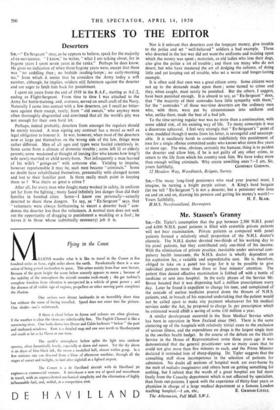LETTERS TO THE EDITOR
Deserters
SIR,—" Ex-Sergeant" may, as he appears to believe, speak for the majority of ex-servicemen. " I know," he writes, " what I am talking about, for in bygone years I spent seven years in the ranks." Perhaps he does know. He gives no indication of when those bygone years were, except that there was " no coddling then ; no bedside reading-lamps ; no early-morning tea," from which it seems that he considers the Army today a soft number, although, he implies, soldiers still fulminate against the deserter and are eager to fetch him back for punishment.
I spent six years from the end of 1939 in the R.A.F., starting as A.C.2, ending as Flight-Sergeant. From time to time I was attached to the Army for battle-training, and, overseas, served on small craft of the Navy. Naturally I came into contact with a few deserters, yet I recall no bitter- ness against them except, rarely, from " old sweats," who anyway were often thoroughly disgruntled and convinced that all the world's pity was not enough for their own hard lot.
Perhaps, indeed probably, deserters from amongst the regulars should be sternly treated. A man signing any contract has a moral as well as legal obligation to honour it. In war, however, when most of the deserters now at large put themselves on the wrong side of the law, things were rather different. Men of all ages and types were hauled relentlessly in. Some came from a climate of domestic trouble ; some left ill or elderly parents; some weakened at thought of leaving (for who knows how long?) wife newly-married or child newly-born. Not infrequently a man learned of his wife's " goings-on " with someone else. Yielding to impulse, however reprehensible it may be, such men became " criminals." Some no doubt have rehabilitated themselves, presumably with changed names and lost to their familiar past. Is there really much point in keeping them so ? Was theirs so great a crime ?
After all, for every man who fought many worked in safety, in uniform yet far from the fighting ; many faced infinitely less danger than did their families in bombed cities. Some—I know one personally—actually deserted to share these dangers. To say, as " Ex-Sergeant " says, that " volunteers were always forthcoming to escort a deserter back " con- demns the deserter less than the volunteers. A normal man does not seek out the opportunity of dragging to punishment a weakling or a fool ; he leaves it to those whose (admittedly necessary) job it is. Nor is it relevant that deserters cost the taxpayer money, give trouble to the police and set " well-behaved " soldiers a bad example. Those who deserted in the last war did not want the uniforms and training upon which the money was spent ; motorists, or old ladies who lose their dogs, also give the police a lot of trouble ; and there are many who do not desert, but who have mastered the art of dodging the column, of doing little and yet keeping out of trouble, who set a worse and longer-lasting example.
It is often said that ours was a great citizen army. Some citizens were not up to the demands made upon them ; some turned to crime and they, when caught, must surely be punished. But the others, I suggest, have been punished enough. It is absurd to say, as " Ex-Sergeant " does, that " the majority of their comrades have little sympathy with them," for the " comrades " of those war-time deserters are the ordinary men who, with them, were put by circumstances into uniform and who, unlike them, made the best of a bad job.
To the time-serving regular war was no more than a continuation, with some added risk, of his existing way of life. To many conscripts it was a disastrous upheaval. I feel very strongly that " Ex-Sergeant's " point of view, muddled though it seems from his letter, is revengeful and unaccept- able. It is needlessly harsh to continue indefinitely this punishment of men for a single offence committed under who knows what stress five years or more ago. The wise, obvious, certainly the humane, thing is to pardon the deserter and allow him, if he is not guilty of any other crime, to return to the life from which his country took him. We have today more than enough willing criminals. Why create unwilling ones ?—I am, Sir,






































 Previous page
Previous page